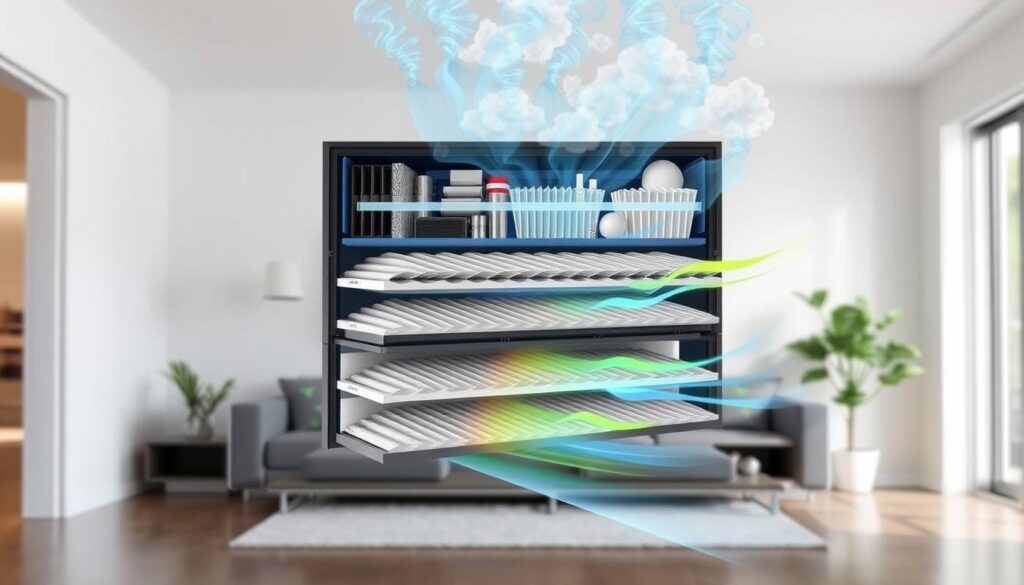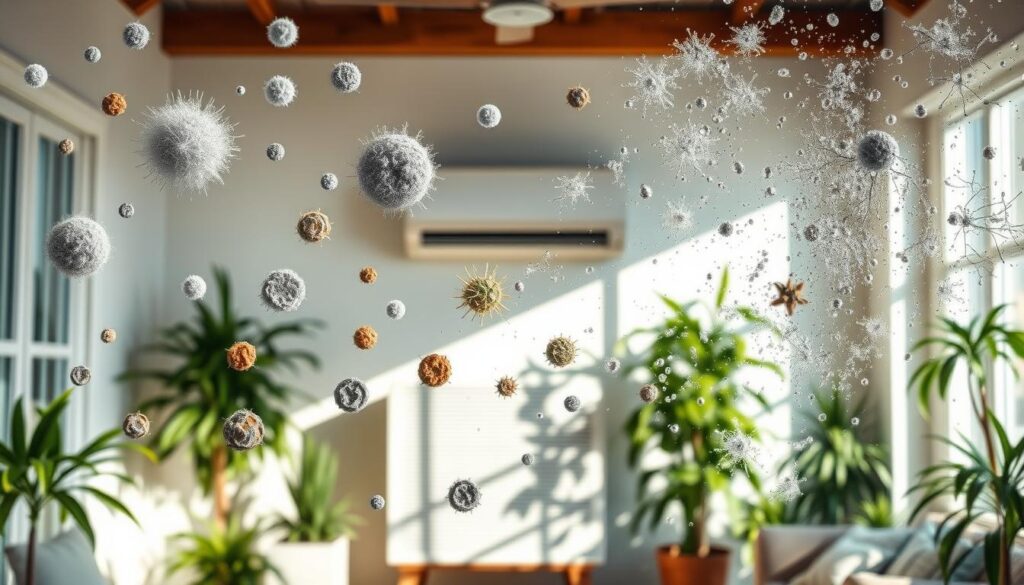- (904) 209-7783
- info@palmsair.com
- Proudly Serving Jacksonville and Nearby Areas
Your air conditioner does more than cool your home. It plays a crucial role in the air you breathe. Poor indoor air can lead to health issues like allergies and respiratory problems.
In 2021, heat waves caused 190 deaths. This fact highlights how important AC systems are for health and safety. Your HVAC system manages air quality by filtering out pollutants.
However, air conditioners recirculate indoor air without bringing in fresh air. This can worsen the effect of pollutants like VOCs, dust, and allergens in your home. Your AC helps maintain the ideal indoor humidity level of 30% to 50%.
Let’s explore how your AC affects the air you breathe. We’ll also learn practical steps to ensure it supports your health.
Your AC system is vital for indoor air quality. It affects the air you breathe at home. Let’s explore how HVAC systems impact your living environment.
HVAC systems use air filters to trap dust and pollen. This stops particles from circulating in your home1. Filter efficiency depends on the MERV rating. Higher ratings mean better particle removal2.
Regular filter cleaning or replacement is crucial. It keeps filtration working well1.

AC units help control indoor humidity. The ideal range is 30% to 50%1. This range prevents mold growth, which thrives in damp conditions1.
Proper humidity control has other benefits too. It can prevent dry skin, eyes, and nasal passages2.
Mold can grow in poorly maintained AC systems. This affects indoor air quality1. Regular cleaning of cooling coils and drain pans stops mold.
Allergy sufferers should use allergen-reducing filters. Keeping AC systems clean is also crucial1.
Good ventilation brings fresh outdoor air inside. This lowers pollutant levels1. HVAC systems mainly circulate indoor air.
Using devices like ERVs or HRVs can boost ventilation. This improves overall air quality2.
Regular maintenance by HVAC pros is key. It keeps your AC running well. It also maintains good indoor air quality1.
Your AC system shapes your home’s air quality. It impacts various aspects of indoor air and your health.
Indoor air pollutants can come from surprising sources. Dust, pollen, pet dander, and mold spores are common culprits. VOCs from cleaning products and radon from the ground also pose risks.
Poor home air quality can trigger allergies, asthma attacks, and other health issues.

Regular AC maintenance ensures clean air in your home. A well-maintained system filters pollutants and controls humidity effectively. Experts suggest professional AC cleaning yearly4.
Choose air filters with higher MERV ratings for better filtration. Stick to a regular replacement schedule4.
Your AC does more than cool air. It maintains ideal room temperature and controls humidity levels. This prevents harmful bacteria and mold growth3.
AC units mainly recycle indoor air. They can work with ventilation systems to bring in fresh outdoor air4.
A well-maintained AC system can boost your respiratory health. It reduces allergy symptoms and asthma triggers by filtering airborne particles. However, AC units alone may not fully purify air.
For better air quality, consider using dedicated air purifiers. The TADIRAN AIROW 3™ reduced detectable Blue Mold by 99.4% in tests4.
Your AC system is crucial for a healthy home and better indoor air. Americans spend 90% of their time inside, where pollutants are much higher than outdoors5. A well-kept HVAC system filters pollutants, controls humidity, and circulates fresh air6.
Regular HVAC maintenance ensures top performance and energy efficiency. This includes changing filters, professional checks, and fixing issues quickly. ASHRAE suggests MERV 13 filters for homes5.
Replacing filters and maintaining your system extends its life. It also keeps or improves indoor air quality6. Indoor pollutants like dust, pollen, and mold can harm your health.
The EPA warns that poor indoor air can cause headaches and breathing problems5. A good AC system filters out these pollutants. It traps particles and provides proper ventilation6.
Understanding your AC’s role in air quality helps you create a healthier home. Invest in pro HVAC services and new tech like smart thermostats. This can boost your health, comfort, and property value6.
Need help optimizing your HVAC system for better indoor air quality? Contact Palms Air today for expert HVAC services and solutions.